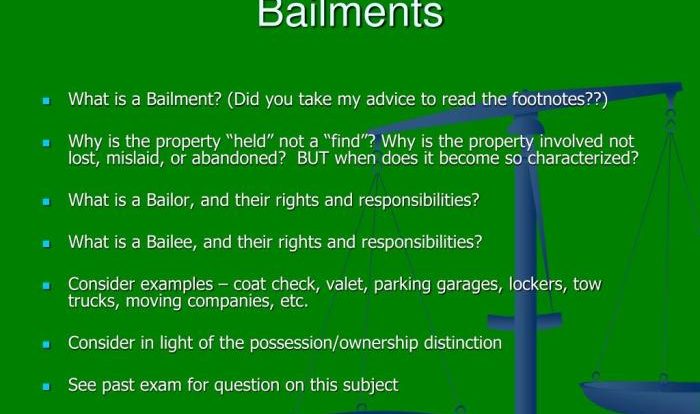Passage from one party to another – The passage of property from one party to another is a fundamental legal concept that governs the transfer of ownership rights. This complex process involves various legal considerations, including contractual obligations, taxation implications, fiduciary duties, and equitable interests.
Understanding the legal framework surrounding property conveyance is essential for individuals and organizations engaging in real estate transactions, business agreements, and other situations where property ownership is transferred.
1. Conveyance of Property
Conveyance of property refers to the legal process of transferring ownership of property from one party (grantor) to another (grantee). This process involves the execution and delivery of a deed, which is a written document that serves as evidence of the transfer.
Types of Property Subject to Conveyance
- Real property (land and buildings)
- Personal property (movable items)
- Intangible property (intellectual property, patents)
Role of Deeds and Legal Documents
Deeds are essential in the conveyance process as they provide legal proof of ownership transfer. They must be properly executed and recorded with the appropriate government authority to ensure the validity of the conveyance.
2. Contractual Obligations: Passage From One Party To Another
Concept of Contractual Obligations
Contractual obligations arise from legally binding agreements between parties. In the context of property conveyance, contracts may establish the terms of the transfer, including the purchase price, payment schedule, and conditions for possession.
Types of Contracts Involving Property Transfer
- Sale contracts
- Lease agreements
- Construction contracts
Legal Remedies for Breach of Contract
If a party breaches a contract related to property conveyance, the non-breaching party may seek legal remedies such as specific performance (forcing the breaching party to fulfill the contract), damages (compensation for losses), or rescission (cancellation of the contract).
3. Taxation and Conveyance

Tax Implications of Property Conveyance
Conveying property can trigger various tax implications, including capital gains tax, transfer taxes, and stamp duties. Understanding these tax obligations is crucial to avoid potential liabilities.
Types of Taxes Applicable to Property Transfers
- Capital gains tax (tax on profits from the sale of property)
- Transfer taxes (taxes imposed on the transfer of ownership)
- Stamp duties (taxes on legal documents related to property transactions)
Strategies for Minimizing Tax Liability
There are various strategies available to minimize tax liability in the context of property conveyance, such as utilizing tax exemptions, claiming deductions, and structuring transactions in a tax-efficient manner.
4. Fiduciary Duties
Concept of Fiduciary Duties
Fiduciary duties arise when one party (fiduciary) has a legal obligation to act in the best interests of another party (beneficiary). In the context of property conveyance, fiduciary duties may arise when one party represents the other in the transaction.
Types of Fiduciary Relationships in Property Conveyance
- Agent-principal relationship
- Attorney-client relationship
- Executor-beneficiary relationship
Legal Consequences of Breaching Fiduciary Duties
Breaching fiduciary duties in the context of property conveyance can lead to legal consequences, including liability for damages, removal from a position of trust, and criminal prosecution.
5. Equitable Interests

Concept of Equitable Interests, Passage from one party to another
Equitable interests in property are rights or interests that are recognized and protected by courts of equity, even if they are not legally recognized. They arise from circumstances such as trusts, constructive trusts, and implied trusts.
Types of Equitable Interests in Property Conveyance
- Equitable ownership
- Equitable liens
- Equitable easements
Legal Remedies for Protecting Equitable Interests
Equitable interests in property can be protected through legal remedies such as injunctions, specific performance, and constructive trusts. These remedies aim to ensure that the rights of the equitable interest holder are upheld.
FAQ Summary
What are the different types of property that can be conveyed?
Property that can be conveyed includes real estate, personal property, and intangible assets such as intellectual property.
What is the role of a deed in the conveyance process?
A deed is a legal document that transfers ownership of real property from one party to another.
What are the tax implications of conveying property?
Property transfers may be subject to various taxes, including capital gains tax, transfer tax, and stamp duty.
What are the fiduciary duties that arise in property conveyance?
Fiduciary duties require parties involved in property conveyance to act in good faith and in the best interests of the other party.
What are equitable interests in property?
Equitable interests are property rights that are recognized in equity but not at law.
